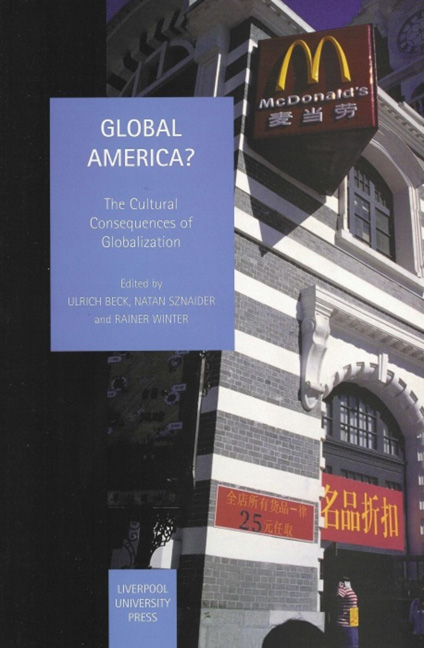Book contents
- Frontmatter
- Contents
- List of Contributors
- Acknowledgments
- Introduction
- PART I THEORETICAL PERSPECTIVES
- PART II NATIONAL CASE STUDIES
- 4 Hyperpower Exceptionalism: Globalization the American Way
- 5 Debating Americanization: The Case of France
- 6 Consumption, Modernity and Japanese Cultural Identity: The Limits of Americanization?
- 7 Americanization, Westernization, Sinification: Modernization or Globalization in China?
- PART III TRANSNATIONAL PROCESSES
- PART IV EPILOGUE
- Rethinking Americanization
5 - Debating Americanization: The Case of France
from PART II - NATIONAL CASE STUDIES
- Frontmatter
- Contents
- List of Contributors
- Acknowledgments
- Introduction
- PART I THEORETICAL PERSPECTIVES
- PART II NATIONAL CASE STUDIES
- 4 Hyperpower Exceptionalism: Globalization the American Way
- 5 Debating Americanization: The Case of France
- 6 Consumption, Modernity and Japanese Cultural Identity: The Limits of Americanization?
- 7 Americanization, Westernization, Sinification: Modernization or Globalization in China?
- PART III TRANSNATIONAL PROCESSES
- PART IV EPILOGUE
- Rethinking Americanization
Summary
The notion of a ‘Global America’ invites application. It asks to be tested at the national level. How might ‘Global America’, for example, apply to France? The question might be posed this way: has France been Americanized? There is considerable evidence, some quantifiable, that this proud nation has succumbed to Americanization.
Language is a place to begin. English, or more precisely, American-English, is the second most popular language among the French. In a recent survey, two out of three French people polled agreed with the statement that ‘everyone should learn to speak English’. American-English is so ubiquitous in popular music, movies, television, radio, the Internet and advertising that the government has tried to limit its use by legislative action. Since the French language is one of the prime markers of French national identity, the popularity of this Anglo-Saxon import is a telling indicator of Americanization. Fast food and soft drinks amplify this story. France now has almost 800 McDonald's restaurants and it has become the third largest overseas market for this Chicagobased multinational. Similarly Coca-Cola controls most of the cola market and about half of the French soft drinks market. In 1998 Hollywood movies earned almost 70 per cent of ticket sales in France. Of the top 20 films only three were French – the rest were American. Some television channels specialize in American programming. Disneyland Paris by the late 1990s attracted more visitors than either Notre Dame or the Louvre. Sports, another form of entertainment, supply more evidence. In 1992 after an American all-star team won the basketball title at the Olympics, a poll of French teenagers voted Michael Jordan the most popular athlete in France. In 1998 the French soccer team won the World Cup and during the trophy awarding ceremony the triumphant fans heard the public address system play not the Marseillaise, but the theme from Star Wars.
Business adds more data. A random walk through almost any French city will lead past the shop windows of American retailers such as Gap, Toys “Я” Us, Baskin Robbins and Ralph Lauren. American-style shopping malls and home and garden centres sit astride highways outside even small towns. Management of French multinationals, according to the business press, has become virtually indistinguishable from that of American corporations.
- Type
- Chapter
- Information
- Global America?The Cultural Consequences of Globalization, pp. 95 - 113Publisher: Liverpool University PressPrint publication year: 2003



